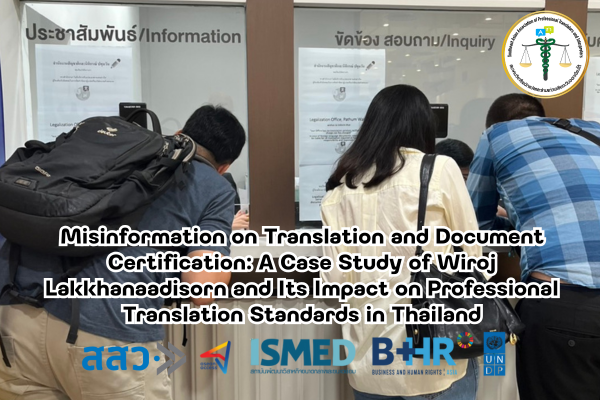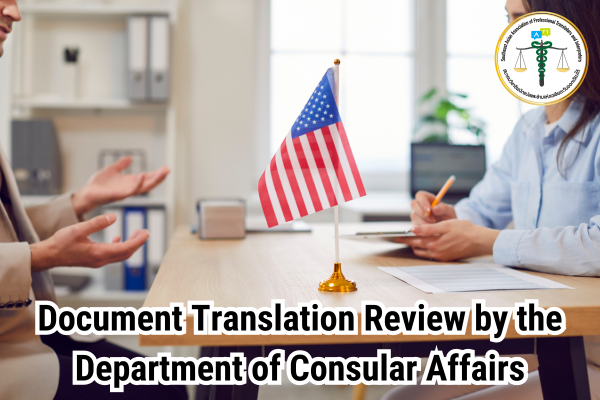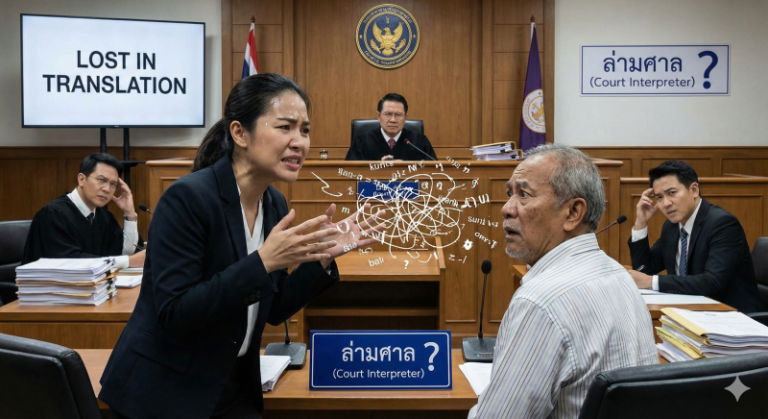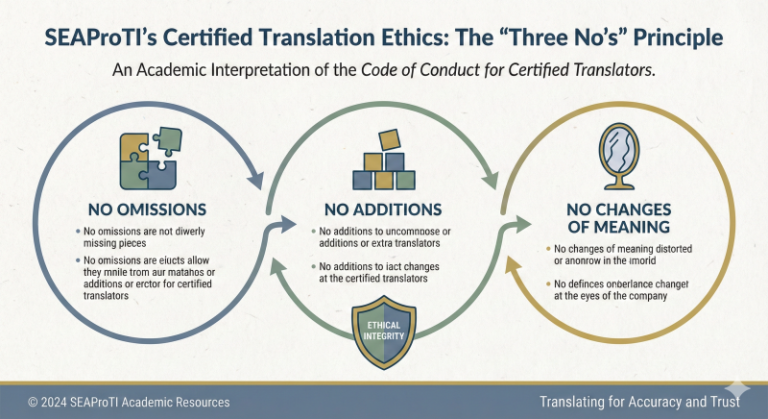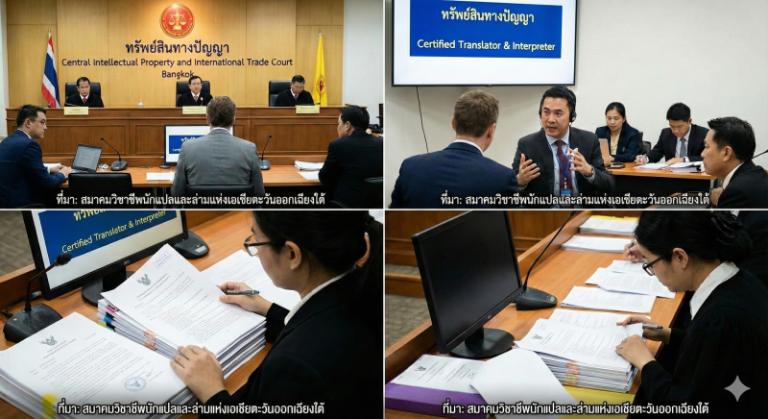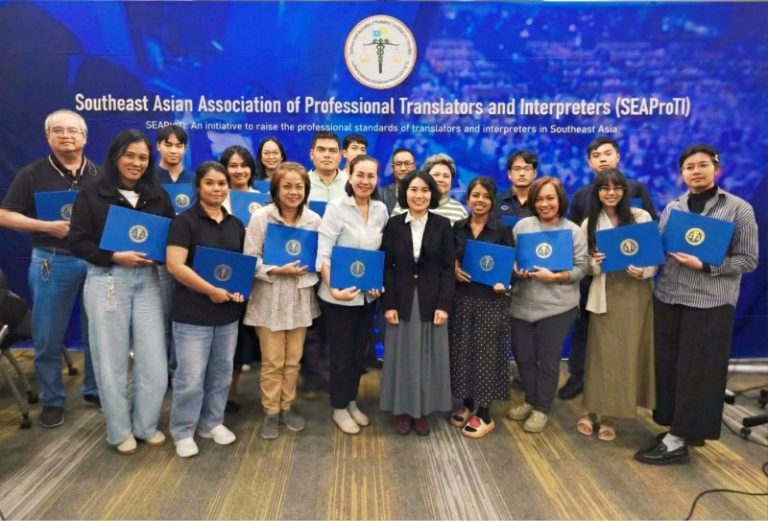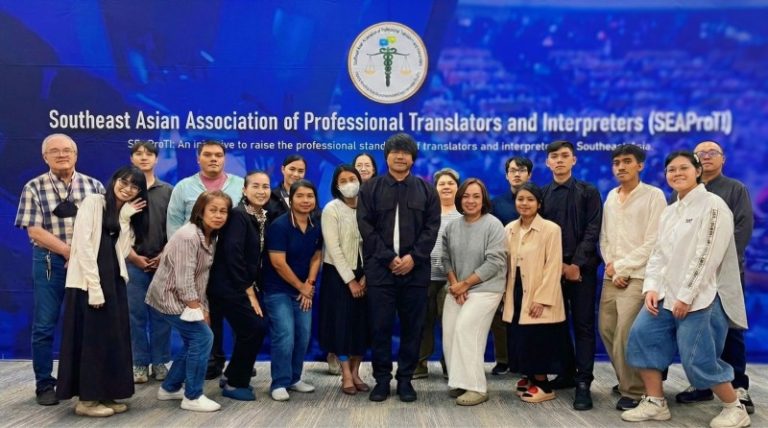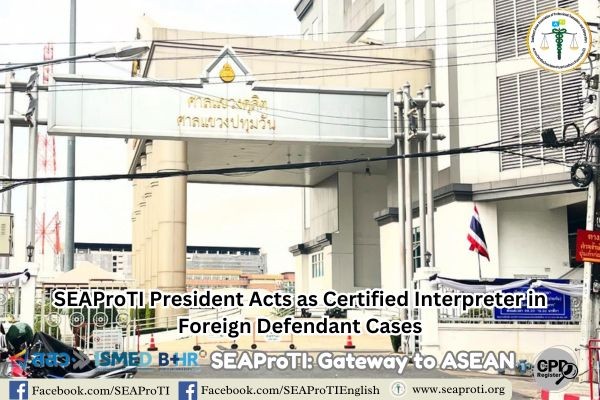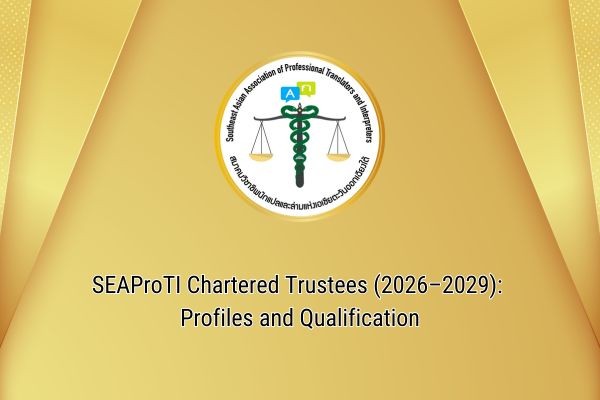Misinformation on Document Translation and Translation Certification:
A Case Study of Wiroj Lakkhanaadisorn and Its Impact on Professional Translation Standards in Thailand
3 May 2025, Bangkok – This article analyzes the consequences of disseminating incorrect information regarding document translation and translation certification in Thailand. Using the public statements made by Mr. Wiroj Lakkhanaadisorn as a case study, the article highlights how such information has led to a widespread misunderstanding that the Department of Consular Affairs, Ministry of Foreign Affairs, operates a translator registration system and has the authority to certify translations. In fact, both practice and law clearly stipulate otherwise, particularly under the Administrative Procedure Act B.E. 2539 (1996), amended B.E. 2540 (1997). This article underscores the necessity of disseminating accurate information and promoting professional translation standards within the Thai legal context.
Introduction
The translation and certification of official translated documents in Thailand is a legal procedure that can directly impact the rights and freedoms of individuals. Misunderstanding this process can result in unlawful litigation or the acceptance of documents that lack legal reliability. The case involving Mr. Wiroj Lakkhanaadisorn, who made public statements referencing a Facebook post by a user named “Eddy Asadang” on October 22, 2024, is an example of how such misinformation can cause confusion and prejudice, and should therefore be scrutinized with academic and professional rigor.
Relevant Extracts from Broadcasts:
PPTV News – “Former Senate Candidate Claims Intimidation by DSI to Avoid Testimony in Collusion Case,” May 2, 2025:
“Subsequently, the Defense Committee, chaired by Mr. Wiroj, invited a representative from ISOC Region 3 for clarification. However, the representative did not appear in person but instead joined via video call. It was explained that the complaint originated from a Facebook account under the name Eddy Asadang, who translated the text found on a program leaflet hosted on a certain website.
ISOC Region 3 did not confirm whether the translation done by this individual had been certified by a translator registered with the Department of Consular Affairs, Ministry of Foreign Affairs.”
Short video from Facebook: Click here
ThaiPBS – “Non-Prosecution Order for Paul Chambers in Lèse-Majesté Case: What Are the Ripple Effects?” May 2, 2025:
“Mr. Wiroj explained that the incident stemmed from a Facebook post by the user ‘Eddy Asadang’ dated October 22, 2024, who personally translated the phrases found on the ISEAS Yusup Isaac Institute’s program document.
However, Mr. Wiroj also noted that the Defense Committee had not received an answer as to whether the translation was certified by a translator registered with the Department of Consular Affairs, and what accountability would be involved.”
Short video from Facebook: Click here
The Claim of “Registered Translators” with the Consular Department: A Misrepresentation
Mr. Wiroj publicly stated that the translated document should have been certified by a “translator registered with the Department of Consular Affairs.” This assertion is factually inaccurate.
The Department of Consular Affairs does not operate a translator registration system. Its role is limited to signature authentication and document legalization, ensuring that Thai-to-English translations may be accepted for use abroad. The department relies on the integrity and identity of the translator, who may be an individual or a reputable agency. While quality checks may be performed by staff at regional offices, there is no formal vetting or qualification process for translators.
Thus, any claim of being “registered” or “certified” by the Department of Consular Affairs constitutes a misrepresentation of status, which may breach ethical standards and lead to widespread public misunderstanding.
Legal Framework for Document Translation Certification in Thailand
Translation of foreign-language documents into Thai for submission to government agencies is governed by the Ministerial Regulation issued under the Administrative Procedure Act B.E. 2539 (1996), amended in B.E. 2540 (1997). This regulation stipulates that a translation may be accepted only when certified by one of the following:
- A Thai national with a degree (not lower than a bachelor’s) from a program where the language in question was the primary language of instruction
- A university lecturer in the relevant language
- The embassy or consulate of that language in Thailand
- A Thai embassy or consulate abroad
(Royal Thai Government Gazette, 1997)
Documents that do not comply with these criteria may not be admissible in court or administrative proceedings. If submitted in litigation, such translations may be challenged for credibility and legal standing.
However, courts may still accept certified translations produced by qualified individuals or entities, including:
- Translators with recognized qualifications
- Translators certified by reputable professional associations
- Private translation firms with a record of reliability
The Paul Chambers Case: Legal Risks of Using Unofficial Translations
Mr. Wiroj stated that a document translated and posted by “Eddy Asadang” was used in a complaint against Dr. Paul Chambers. He further suggested that this translation should have been certified by a translator registered with the Consular Department. As established earlier, this claim is legally unfounded.
In fact, the translation could have been valid if “Eddy Asadang” had simply certified it himself and assumed legal responsibility for its accuracy. This is consistent with the principle that the certifying party bears responsibility for the translation’s authenticity.
If a court or authority accepts a translation that fails to meet legal certification standards, the resulting proceedings may lack documentary legitimacy.
In sensitive cases—particularly those involving national security or lèse-majesté allegations—source validation and translation accuracy must be enforced rigorously. According to linguistic scholars, failure to do so may result in language being used as a tool of state power or as a mechanism for infringing upon rights (Eades, 2010; Coulthard & Johnson, 2017).
Policy and Professional Recommendations
To prevent similar misinformation and enhance translation standards, this article proposes the following actions:
- The Ministry of Foreign Affairs or the Department of Consular Affairs should issue an official notice clarifying that no translator registration system exists and prohibiting false claims.
- Legal literacy campaigns and translator training curricula should incorporate accurate information on translation certification protocols.
- Government and legal institutions should prioritize translators certified by professional bodies such as the Southeast Asian Association of Professional Translators and Interpreters (SEAProTI) to ensure transparency and trust.
- A quality assurance mechanism for legal and administrative translations should be developed, using forensic linguists as independent evaluators to uphold accuracy and fairness.
Conclusion
The public statements by Mr. Wiroj Lakkhanaadisorn regarding translation certification reflect a broader issue of misinformation in areas that affect rights, freedoms, and justice. Maintaining professional standards and ensuring accuracy in public communication is a shared responsibility among state actors, language professionals, and the public.
References
- Coulthard, M., & Johnson, A. (2017). An Introduction to Forensic Linguistics: Language in Evidence (2nd ed.). Routledge.
- Eades, D. (2010). Sociolinguistics and the Legal Process. Multilingual Matters.
- Department of Consular Affairs. (2024). Guidelines on Translation Certification. Ministry of Foreign Affairs, Thailand.
- Royal Thai Government Gazette. (1997). Ministerial Regulation under the Administrative Procedure Act B.E. 2539 (1996). Vol. 114, Part 8 Ngor.
- Southeast Asian Association of Professional Translators and Interpreters. (2025). Guidelines for Legally Recognized Translation Certification. Internal publication.
- PPTV News. (2025, May 2). Former Senate Candidate Claims DSI Intimidation in Collusion Case [Television broadcast].
- ThaiPBS. (2025, May 2). Prosecutors Drop Charges Against Paul Chambers in Lèse-Majesté Case [Television broadcast].
Mr. Wiroj Lakkhanaadisorn (นายวิโรจน์ ลักขณาอดิศร) is a Thai politician known for his active role in scrutinizing government operations and military affairs. As of recent years, he has been affiliated with the People’s Party, one of Thailand’s progressive opposition parties. He previously served as a Member of Parliament and is recognized for his vocal stance on issues of transparency, civil rights, and military reform.
In 2025, Mr. Wiroj served as Chairperson of the House Committee on Defence Affairs (กรรมาธิการทหาร สภาผู้แทนราษฎร), where he led inquiries into military and security-related matters, including the controversial lèse-majesté (Section 112) case involving Dr. Paul Chambers. His public comments on translation and legal documentation, particularly regarding the supposed “translator registration” with the Consular Department, have drawn attention and criticism from professional language associations for misrepresenting legal processes related to translation certification.
SEAProTI’s certified translators, translation certification providers, and certified interpreters:
The Southeast Asian Association of Professional Translators and Interpreters (SEAProTI) has officially announced the criteria and qualifications for individuals to register as “Certified Translators,” “Translation Certification Providers,” and “Certified Interpreters” under the association’s regulations. These guidelines are detailed in Sections 9 and 10 of the Royal Thai Government Gazette, issued by the Secretariat of the Cabinet under the Office of the Prime Minister of the Kingdom of Thailand, dated July 25, 2024, Volume 141, Part 66 Ng, Page 100.
To read the full publication, visit: the Royal Thai Government Gazette
การให้ข้อมูลคลาดเคลื่อนเกี่ยวกับการแปลและการรับรองการแปล:
กรณีศึกษาคุณวิโรจน์ ลักขณาอดิศร กับผลกระทบต่อมาตรฐานวิชาชีพการแปลในประเทศไทย
3 พฤษภาคม 2568, กรุงเทพมหานคร – บทความนี้วิเคราะห์ผลกระทบจากการให้ข้อมูลไม่ถูกต้องเกี่ยวกับการแปลและการรับรองการแปลในประเทศไทย โดยใช้กรณีของคุณวิโรจน์ ลักขณาอดิศร ซึ่งให้ข้อมูลต่อสาธารณะในลักษณะที่ก่อให้เกิดความเข้าใจผิดว่า กรมการกงสุล กระทรวงการต่างประเทศมีการ “ขึ้นทะเบียนนักแปล” และสามารถรับรองการแปลเอกสารได้ ทั้งที่ในทางปฏิบัติและกฎหมาย การรับรองการแปลมีเงื่อนไขที่ชัดเจนภายใต้ พ.ร.บ. วิธีปฏิบัติราชการทางปกครอง พ.ศ. 2539 แก้ไขเพิ่มเติม พ.ศ. 2540 บทความนี้ชี้ให้เห็นถึงความจำเป็นในการเผยแพร่ข้อมูลที่ถูกต้อง และการส่งเสริมมาตรฐานวิชาชีพนักแปลในบริบทของกฎหมายไทย
บทนำ
การแปลเอกสารราชการและการรับรองเอกสารแปลในประเทศไทยเป็นกิจกรรมที่มีผลทางกฎหมายและกระทบต่อสิทธิเสรีภาพของบุคคลจำนวนมาก ความเข้าใจผิดในเรื่องนี้จึงอาจนำไปสู่การดำเนินคดีที่ไม่ชอบด้วยกฎหมาย หรือการยอมรับเอกสารที่ไม่มีความน่าเชื่อถือทางกฎหมาย ซึ่งกรณีของคุณวิโรจน์ ลักขณาอดิศร ให้ข้อมูลแก่สื่อมวลชน (ดูอ้างอิงเนื้อหาถัดไป) เกี่ยวกับข้อความที่ปรากฏในโพสต์ของผู้ใช้เฟซบุ๊กชื่อ “เอ็ดดี้ อัษฎางค์” เมื่อวันที่ 22 ตุลาคม 2567 เป็นตัวอย่างของการเผยแพร่ข้อมูลที่ก่อให้เกิดความคลาดเคลื่อนและเลือกปฏิบัติ ซึ่งควรได้รับพูดถึงอย่างจริงจังในเชิงวิชาการ
ข้อความจากผู้ประกาศของ PPTV บางช่วงที่เกี่ยวข้อง:
“02:22 (ผู้ประกาศข่าวชาย) หลังจากนั้นทาง กมธ. ทหาร โดยมีคุณวิโรจน์เป็นประธานนะครับ ก็มีการเชิญตัวแทนของ กอ.รมน.ภาค 3 ให้มาชี้แจง
02:31 (ผู้ประกาศข่าวชาย) แต่วันนั้นเนี่ยทาง ตัวแทนของ กอ.รมน.ภาค 3 เนี่ย ไม่ได้มาชี้แจงด้วยตัวเองนะครับ มีการประชุมกันผ่านทางวิดีโอคอล นะครับ ก็มีการชี้แจงได้ความว่า การแจ้งความดำเนินคดีมาจาก Facebook ของบัญชีผู้ใช้งานที่ชื่อว่า เอดดี้ อัษฎางค์ นะครับ เป็นผู้แปลคำที่ปรากฏบนสูจิบัตรที่เผยแพร่อยู่ในเว็บไซต์นึง
02:55 (ผู้ประกาศข่าวชาย) แต่ กอ.รมน.ภาค 3 ไม่ได้ให้คำตอบนะครับว่า การแปลของ เจ้าของบัญชีที่ชื่อว่า เอดดี้ อัษฎางค์ เนี่ย ได้รับการรับรอง จากผู้แปลที่ขึ้นทะเบียนกับกรมการกงสุล กระทรวงการต่างประเทศหรือไม่”
อ้างอิงเนื้อหาจากข่าวของ PPTV: อดีตผู้สมัคร สว. ร้อง DSI ถูกข่มขู่ไม่ให้เป็นพยานคดีฮั้ว สว. | เที่ยงทันข่าว | 2 พ.ค. 68
คลิปสั้นจากเฟสบุ๊ก: คลิกที่นี่
ข้อความจากผู้ประกาศของ ThaiPBS บางช่วงที่เกี่ยวข้อง:
“14:52 ซึ่งในเรื่องนี้ คุณวิโรจน์ ก็ บอกว่า ที่มาที่ไป เหตุการณ์นี้ก็บอกว่า อ่า มาจาก Facebook ของผู้ใช้งาน ใช้ชื่อว่า เอ็ดดี้ อัสดางค์ โพสต์วันที่ 22 ตุลาคม 66
15:05 เป็นคนแปลถ้อยคำเองด้วย ที่อยู่บนสูจิบัตร ที่เผยแพร่อยู่บนเว็บไซต์ของ ISEAS ยูซุป อิซัก Institute
15:14 แต่ว่า คุณวิโรจน์ บอกว่า ครั้งนั้นเนี่ย ก็ไม่ได้ให้คำตอบกับ กมธ. การทหารนะ ว่าการแปลบัญชี ของคนที่ใช้งานที่ชื่อ เอ็ดดี้ อัสดางค์ เนี่ย
15:25 มีการรับรองการแปล จากผู้แปลที่ขึ้นทะเบียนกับกรมการกงสุลแล้วหรือไม่ แล้วเขาจะรับผิดชอบเรื่องนี้อย่างไร”
อ้างอิงเนื้อหาจากข่าวของ ThaiPBS: คำสั่งไม่ฟ้อง “พอล แชมเบอร์ส” คดี ม.112 ส่งผลอย่างไรบ้าง | เสิร์ฟติดข่าว | 2 พ.ค. 68
คลิปสั้นจากเฟสบุ๊ก: คลิกดูที่นี่
การอ้างว่ากรมการกงสุล “ขึ้นทะเบียนนักแปล”: การแอบอ้างที่ขัดต่อข้อเท็จจริง
คุณวิโรจน์ ลักขณาอดิศร ให้ข้อมูลกับสื่อมวลชนว่า โพสต์ดังกล่าว ที่อ้างว่า เป็นเอกสารแปลที่ผู้ใช้เฟซบุ๊กชื่อ “เอ็ดดี้ อัษฎางค์” แปลนั้นควรได้รับการรับรองจาก “นักแปลที่ขึ้นทะเบียนกับกรมการกงสุล” ซึ่งในความเป็นจริง กรมการกงสุลไม่มีระบบการขึ้นทะเบียนนักแปล แต่อย่างใด
กรมการกงสุลมีหน้าที่เพียง รับรองลายมือชื่อผู้แปล (signature authentication) และนิติกรณ์เอกสาร (Legalization) เพื่อให้เอกสารที่แปลจากภาษาไทยเป็นภาษาอังกฤษสามารถนำไปใช้ในต่างประเทศได้ โดยอาศัยความน่าเชื่อถือของผู้แปลเป็นหลัก โดยผู้แปลสามารถเป็นใครก็ได้ หรือร้านแปลหรือบริษัทแปลที่น่าเชื่อถือ เป็นผู้แปลเอกสารมาเอง เพื่อให้กรมการกงสุลรับรองลายมือชื่อผู้แปลและนิติกรณ์เอกสาร โดยกรมการกงสุลอาจช่วยนักแปลตรวจสอบคุณภาพของการแปลโดยมีเจ้าหน้าที่ตรวจแก้คำแปลคอยให้บริการตามศูนย์ต่าง ๆ ทั่วประเทศ แต่ไม่ได้ตรวจสอบคุณวุฒิของผู้แปลแต่อย่างใด ดังนั้น ผู้ใดก็ตามที่กล่าวอ้างว่าเป็นนักแปลที่ได้รับการขึ้นทะเบียนหรือรับรองจากกรมการกงสุล จึงเข้าข่ายการแอบอ้างสถานะ ซึ่งอาจเป็นการละเมิดจริยธรรมวิชาชีพและก่อให้เกิดความเข้าใจผิดในวงกว้าง
กรอบกฎหมายว่าด้วยการรับรองคำแปลเอกสารในราชการไทย
การแปลเอกสารจากภาษาต่างประเทศเป็นภาษาไทยเพื่อยื่นต่อหน่วยงานของรัฐ มีการกำหนดอย่างชัดเจนในกฎหมายไทย โดยเฉพาะ กฎกระทรวงฯ ออกตามความใน พ.ร.บ. วิธีปฏิบัติราชการทางปกครอง พ.ศ. 2539 แก้ไขเพิ่มเติม พ.ศ. 2540 กำหนดว่าเอกสารแปลจะได้รับการยอมรับในราชการได้ ก็ต่อเมื่อได้รับการรับรองจากบุคคลหรือองค์กรต่อไปนี้:
- คนไทยที่จบการศึกษาในระดับไม่ต่ำกว่าปริญญาตรี ในหลักสูตรที่ใช้ภาษานั้นเป็นภาษาหลัก
- อาจารย์สอนภาษานั้นในระดับอุดมศึกษา
- สถานทูตหรือสถานกงสุลของประเทศเจ้าของภาษาในประเทศไทย
- สถานทูตหรือสถานกงสุลไทยในต่างประเทศ (ราชกิจจานุเบกษา, 2540)
ในกรณีที่ไม่ปฏิบัติตามหลักเกณฑ์ดังกล่าว เอกสารแปล “อาจ” ไม่ได้รับการยอมรับในกระบวนการพิจารณาคดีหรือกระบวนการทางปกครอง และหากนำไปใช้ประกอบการฟ้องร้อง อาจมีผลกระทบต่อความน่าเชื่อถือและสถานะของพยานหลักฐาน นอกจากนี้ ศาลยังยอมรับเอกสารที่แปลและรับรองการแปลจากเอกชน เช่น นักแปลที่มีคุณวุฒิที่น่าเชื่อถือหรือมีใบรับรองนักแปลจากหน่วยงานรับรองหรือสมาคมวิชาชีพที่น่าเชื่อถือ หรือร้านแปลเอกชนหรือบริษัทแปลที่น่าเชื่อถือ ด้วยเหมือนกัน
กรณีคดี พอล แชมเบอร์ส: ผลกระทบจากการใช้เอกสารแปลที่ไม่เป็นทางการ
กรณีที่ คุณวิโรจน์ ลักขณาอดิศร ให้ข้อมูลกับสื่อมวลชนว่า ผู้ใช้เฟซบุ๊กชื่อ “เอ็ดดี้ อัษฎางค์” แปลและเผยแพร่เอกสารเพื่อนำไปใช้ประกอบการฟ้องร้อง ดร. พอล แชมเบอร์ส และว่า จะต้องรับรองโดยนักแปลที่ “ขึ้นทะเบียนกับกรมการกงสุล” นั้น ขัดต่อข้อเท็จจริงและกฎหมายตามที่กล่าวมา ทั้งนี้ ในกรณีนี้แก้ปัญหาได้โดย ผู้ใช้เฟซบุ๊กชื่อ “เอ็ดดี้ อัษฎางค์” แปลและรับรองการแปลด้วยตัวเอง ก็จะถูกต้องตามมาตรฐานการเตรียมเอกสารแปลเพื่อใช้ประกอบในการฟ้องคดี ด้วยแนวคิดหลักที่ว่า “ผู้รับรองการแปลจะต้องรับผิดชอบกับการรับรองนั้นหรือมีความรับผิดทางกฎหมายเอง” หากหน่วยงานที่รับเรื่องหรือศาลอิงข้อมูลจากการแปลที่ไม่ได้รับการรับรองตามหลักเกณฑ์ ก็อาจเป็นเหตุให้การดำเนินคดีดังกล่าว ขาดความชอบธรรมในเชิงพยานเอกสาร
ทั้งนี้ ในคดีสำคัญระดับสูง โดยเฉพาะคดีความมั่นคงหรือคดีหมิ่นประมาทสถาบัน การตรวจสอบแหล่งที่มาและความถูกต้องของการแปลเอกสารควรเป็นสิ่งที่ดำเนินการอย่างเข้มงวด (Eades, 2010; Coulthard & Johnson, 2017) เพื่อป้องกันการใช้ภาษาเป็นเครื่องมือทางอำนาจหรือการละเมิดสิทธิของผู้ถูกกล่าวหา
ข้อเสนอเชิงนโยบายและวิชาชีพ
เพื่อยกระดับมาตรฐานวิชาชีพนักแปล และป้องกันความเข้าใจผิดในสาธารณะ บทความนี้ขอเสนอแนวทางดังต่อไปนี้:
- ออกประกาศอย่างเป็นทางการ จากกระทรวงการต่างประเทศหรือกรมการกงสุล ว่าไม่มีระบบการขึ้นทะเบียนนักแปล และห้ามการอ้างอิงดังกล่าว
- ส่งเสริมการเผยแพร่ความรู้ทางกฎหมาย เกี่ยวกับการรับรองคำแปลในราชการผ่านสื่อและหลักสูตรอบรมนักแปล
- ส่งเสริมการใช้ผู้แปลและผู้รับรองการแปลที่ผ่านการรับรองจากองค์กรวิชาชีพ เช่น สมาคมวิชาชีพนักแปลและล่ามแห่งเอเชียตะวันออกเฉียงใต้ (SEAProTI) เพื่อความโปร่งใสและน่าเชื่อถือ
- สนับสนุนการพัฒนากลไกตรวจสอบคุณภาพของคำแปลทางกฎหมายและทางปกครอง โดยการอาศัยผู้เชี่ยวชาญด้านนิติภาษาศาสตร์เป็นผู้ประเมินอิสระ
สรุป
กรณีที่คุณวิโรจน์ ลักขณาอดิศร ให้ข้อมูลกับสื่อมวลชนเรื่องการรับรองการแปลเอกสารเพื่อใช้ประกอบในการฟ้องคดีนั้น เป็นภาพสะท้อนถึงความเสี่ยงที่เกิดจากการให้ข้อมูลคลาดเคลื่อนในประเด็นที่มีผลต่อสิทธิ เสรีภาพ และกระบวนการยุติธรรม การรักษามาตรฐานวิชาชีพและความถูกต้องของข้อมูลจึงเป็นหน้าที่ร่วมกันของภาครัฐ นักวิชาชีพ และผู้ที่เกี่ยวข้องทั้งหมด
เอกสารอ้างอิง
- Coulthard, M., & Johnson, A. (2017). An Introduction to Forensic Linguistics: Language in Evidence (2nd ed.). Routledge.
- Eades, D. (2010). Sociolinguistics and the Legal Process. Multilingual Matters.
- กระทรวงการต่างประเทศ. (2567). แนวทางการรับรองเอกสารแปล. กรมการกงสุล.
- ราชกิจจานุเบกษา. (2540). กฎกระทรวงออกตามความในพระราชบัญญัติวิธีปฏิบัติราชการทางปกครอง พ.ศ. 2539. เล่ม 114 ตอนพิเศษ 8 ง.
- สมาคมวิชาชีพนักแปลและล่ามแห่งเอเชียตะวันออกเฉียงใต้. (2025). แนวปฏิบัติการรับรองการแปลที่ถูกต้องตามกฎหมาย. เอกสารเผยแพร่ภายใน.
นายวิโรจน์ ลักขณาอดิศร เป็นนักการเมืองไทยที่มีบทบาทโดดเด่นในการตรวจสอบการทำงานของรัฐบาลและกองทัพ ในช่วงไม่กี่ปีที่ผ่านมา เขาสังกัด พรรคประชาชน ซึ่งเป็นหนึ่งในพรรคฝ่ายค้านแนวทางก้าวหน้าในประเทศไทย เขาเคยดำรงตำแหน่งสมาชิกสภาผู้แทนราษฎร และเป็นที่รู้จักจากการแสดงจุดยืนอย่างชัดเจนในประเด็นความโปร่งใส สิทธิพลเมือง และการปฏิรูปกองทัพ
ในปี 2568 นายวิโรจน์ดำรงตำแหน่งประธานกรรมาธิการทหาร สภาผู้แทนราษฎร ซึ่งเป็นผู้ดำเนินการตรวจสอบข้อเท็จจริงเกี่ยวกับประเด็นด้านความมั่นคงและการทหาร รวมถึงคดีหมิ่นพระบรมเดชานุภาพ (มาตรา 112) อันเป็นคดีที่มีความอ่อนไหว โดยเฉพาะกรณีของ ดร. พอล แชมเบอร์ส ทั้งนี้ ถ้อยแถลงของเขาต่อสาธารณะเกี่ยวกับการแปลเอกสารและการรับรองคำแปลโดยเฉพาะประเด็นที่เขากล่าวอ้างถึงระบบ “การขึ้นทะเบียนนักแปล” กับกรมการกงสุลได้ก่อให้เกิดกระแสวิพากษ์วิจารณ์จากสมาคมวิชาชีพด้านภาษา ที่ชี้ว่าเป็นการให้ข้อมูลคลาดเคลื่อนเกี่ยวกับกระบวนการทางกฎหมายในการรับรองการแปลในประเทศไทย
เกี่ยวกับนักแปลรับรอง ผู้รับรองการแปล และล่ามรับรองของสมาคมวิชาชีพนักแปลและล่ามแห่งเอเชียตะวันออกเฉียงใต้
สมาคมวิชาชีพนักแปลและล่ามแห่งเอเชียตะวันออกเฉียงใต้ (SEAProTI) ได้ประกาศหลักเกณฑ์และคุณสมบัติผู้ที่ขึ้นทะเบียนเป็น “นักแปลรับรอง (Certified Translators) และผู้รับรองการแปล (Translation Certification Providers) และล่ามรับรอง (Certified Interpreters)” ของสมาคม หมวดที่ 9 และหมวดที่ 10 ในราชกิจจานุเบกษา ของสำนักเลขาธิการคณะรัฐมนตรี ในสำนักนายกรัฐมนตรี แห่งราชอาณาจักรไทย ลงวันที่ 25 ก.ค. 2567 เล่มที่ 141 ตอนที่ 66 ง หน้า 100 อ่านฉบับเต็มได้ที่: นักแปลรับรอง ผู้รับรองการแปล และล่ามรับรอง


